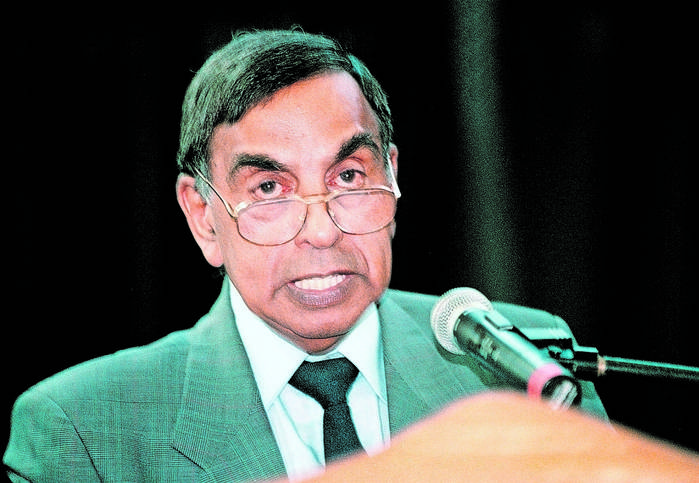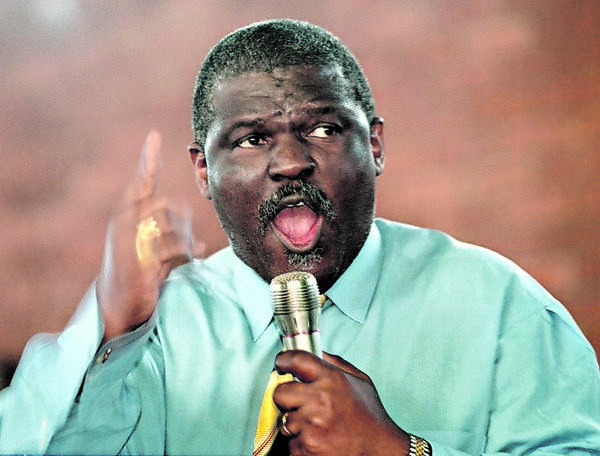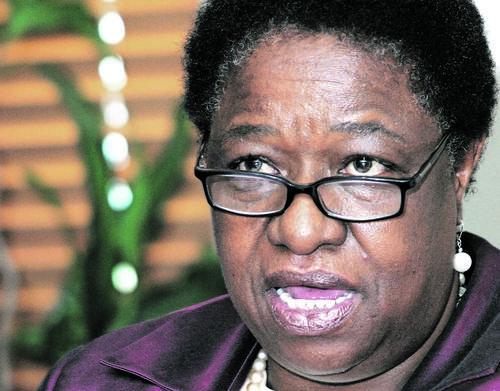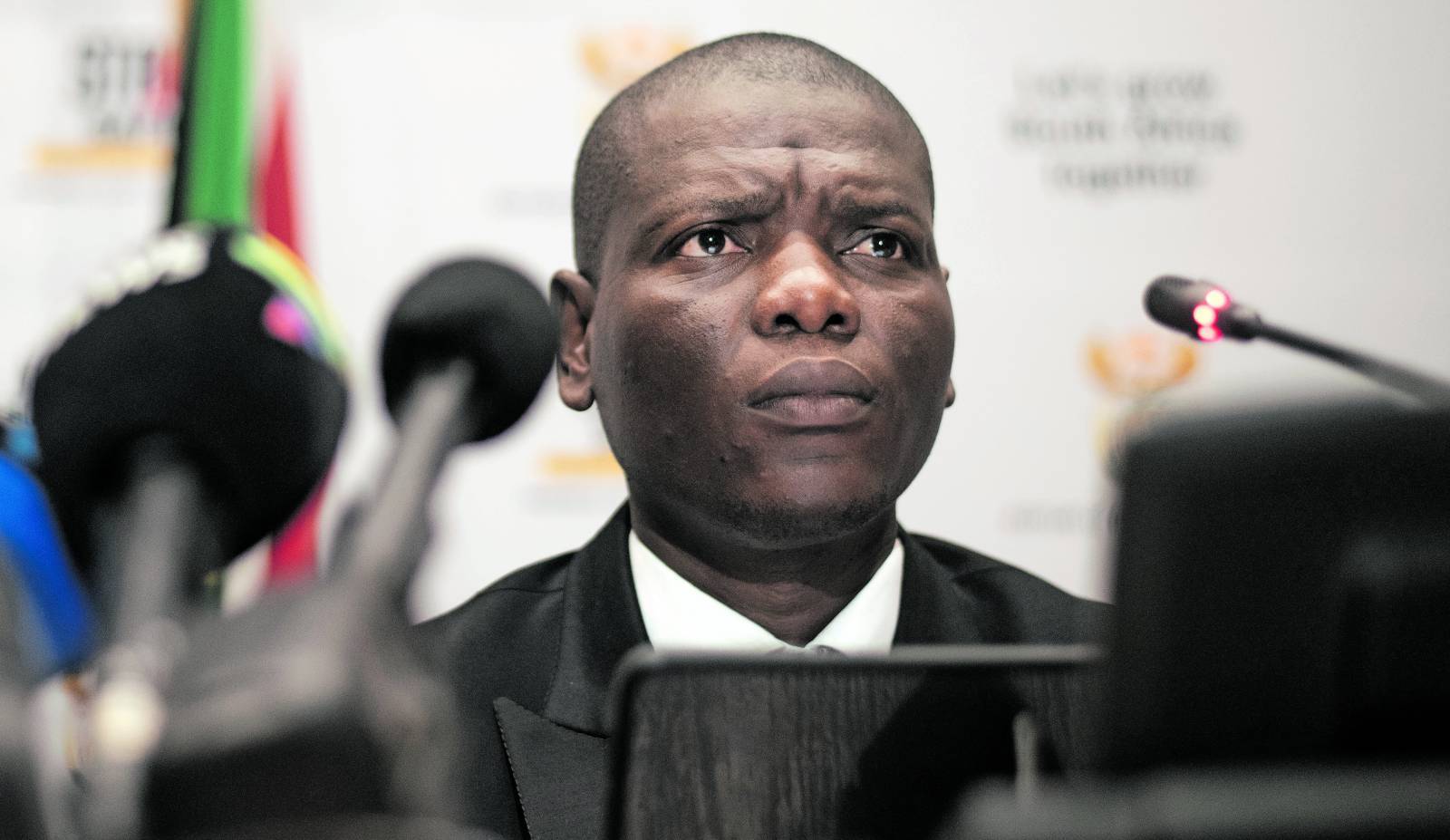The high court in Johannesburg has declared that it is unreasonable to offer social grant beneficiaries insurance for disability and retrenchment if they are already disabled or unemployed.
The ANC’s shifting take on the rule of law
The initial commitment, informed by the constitutional dream of the struggle, has been trundled underfoot by ministers and presidents
GRADE = D
As the year draws to an end, the justice department takes particular pride in being close “to bringing back the Scorpions”.
The criticism of the bill meant to revive the defunct investigating arm of the National Prosecuting Authority (NPA) and the fact that it was disbanded in the first place tells of the political storms that have swept the portfolio for three decades.
In 1994, the work of the new ministry of justice and constitutional development was, as its name suggested, to realise the ideal of a democracy guided by a Constitution that recognises the injustices of the past and extends justiciable rights to every individual.
It had to replace order, in one of its most perverse expressions, with justice. For a while, all went well.
Then minister Dullah Omar had to set up the constitutional court and the chapter nine institutions, as well as a new, independent prosecutions service although it falls, to this day, within the ultimate political oversight of the ministry. Appreciation of the scale of the task has dimmed with time; it is now a vague memory that it took a year to negotiate the hierarchy of the courts.
In these formative years, there was an entente between the executive and the judiciary born from the Mandela administration’s respect for the latter’s role in a country where, to quote Arthur Chaskalson at the inauguration of the constitutional court, “for the first time the Constitution trumps parliament”.
With Mandela as the president, the court laid down precedent that affirmed the principle of legality as a limitation on public power and would, in time, launch a thousand rationality reviews.
Omar also oversaw the establishment of the Truth and Reconciliation Commission, which would become a model of transitional justice loosely copied in other countries. The lack of consequence for apartheid killers who failed to seek or obtain amnesty drew criticism that he became “the minister for dispensing with justice”.
It was unfair because the government as a collective lost the will to see the project to its conclusion, both as far as compensating victims and prosecuting the perpetrators.
But some, among them late Democratic Alliance MP Dene Smuts, thought the promise of restoring the normal operation of the law and the respect for the consequences of breaking it, started wavering at this point.
Under Penuell Maduna, so did the executive’s early regard for the judiciary. He introduced bills that were ostensibly intended to transform the legal profession and the lower courts but read as an onslaught on the independence of both.
The Legal Practice Bill put advocates and attorneys under a single council the minister could decide to dissolve. Chaskalson warned that this was inimical to the independence of the profession.
The Magistrate’s Act and the Magistrate’s Court Act drew warning letters from the United Nations special delegate for an independent judiciary, the chair of the International Bar Association and Justice Bernard Ngoepe, the judge president of what was still the Transvaal division in early 2001.
The Pretoria high court declared several sections of the two laws unconstitutional, saying the regime would have robbed the magistrate’s and regional courts of independence from executive authority.
But it was the arms deal saga, and the faultlines it exposed in the ANC, that made Maduna leave the government in 2004.
He advised then president Thabo Mbeki not to issue a proclamation that would allow the Special Investigating Unit, then under Judge Willem Heath, to look into high-level corruption in the deal. When Heath refused to hand over sensitive documents, Maduna threatened to close the unit.
In 2003, the minister stood next to Bulelani Ngcuka, the national director of public prosecutions, when Ngcuka announced that Jacob Zuma would not be charged with corruption alongside Schabir Shaik, despite prima facie evidence against the deputy president. The charges stemmed from one of the first investigations conducted by the Scorpions.
In 2008, the infamous Nicholson ruling would find in Maduna’s presence at that media briefing proof of a political plot to target Zuma. The appellate court later dismissed this as Judge Chris Nicholson’s “own conspiracy theory” but not before Mbeki had resigned.
By then there were less farflung allegations of presidential meddling in prosecutorial decisions. They arose after Mbeki suspended Ngcuka’s successor, Vusi Pikoli, who had indicted Zuma in 2005, days after the president fired Zuma. Shaik’s conviction left him little choice.
But Justice Herbert Msimang struck the case against Zuma off the roll the following year, noting that it hinged on the outcome of challenges to the validity of search-and-seizure raids by the Scorpions. The charges were revived in 2007, but after Pikoli was suspended.
The official reason was the breakdown of trust between Pikoli and Maduna’s successor, Brigitte Mabandla. But Pikoli told the Ginwala inquiry that Mabandla had instructed him in writing not to arrest national police commissioner Jackie Selebi until she was satisfied this was in the public interest.

Dullah Omar
1994 – 1999

Penuell Maduna
1999 – 2004

Brigitte Mabandla
2004 – 2008

Enver Surty
2008 – 2009

Jeff Radebe
2009 – 2014

Michael Masutha2014 – 2019

Current Justice Minister Ronald Lamola. (Brenton Geach/Gallo Images and Phill Magakoe/ Gallo Images)
Again, it was the Scorpions who had investigated Selebi — an ally of Mbeki’s in the power struggle between him and Zuma.
Ginwala cleared Pikoli of any wrongdoing. She also largely cleared Mabandla, finding that she had been misled by director general Menzi Simelane. He made false allegations against Pikoli, and along the way the troubling assertion that the independence of the NPA was not enshrined in the Constitution.
Mabandla’s tenure would never be more than the next episode in the state’s existential battle around Zuma’s indictment, and the related tension over the future of prosecutions-led investigations.
The minister told the Khampepe commission the Scorpions should be subsumed into the police, saying it would ensure more “formidable” investigative work, when the dismal end result would be the Directorate for Priority Crime Investigations (Hawks). The commission disagreed and its findings were accepted, in qualified form, by Mbeki and the cabinet, but when Zuma wrestled the ANC presidency from him in Polokwane in 2007, the writing was on the wall.
The axe fell under Enver Surty, who served as a placeholder in the ministry while Kgalema Motlante did the same in the presidency. He downplayed fears that escalating attacks on the judiciary threatened its integrity and independence.
It was not a credible denial, less so coming from a former lawyer. In January 2005, on the 93rd anniversary of the ANC, the party’s national executive complained that the “collective mindset” of the judiciary was not aligned to the aspirations of South Africans.
It said many judges “do not see themselves as being part of these masses, accountable to them, and inspired by their hopes, dreams and value systems”.
Seventeen years later, Lindiwe Sisulu expounded on this sentiment in an obscene attack on the judiciary. That she felt free to call judges “house niggers” speaks of the contempt for the courts and the justice system that festered under the Zuma administration.
It was never clear what qualified Jeff Radebe for the job of justice minister, other than his resolve to protect Zuma as the president dodged not only a return of the corruption charges but any consequences for the Nkandla scandal.
Insiders say it was he rather than Zuma who worked tirelessly to prevent deputy chief justice Dikgang Moseneke from succeeding Sandile Ngcoko when he retired in 2011.
They also say Radebe did the bench a disservice that is felt to this day by making sure that transformation mattered more than skill when the Judicial Service Commission (JSC) appointed judges.
In mid-2009, Radebe put JSC interviews on hold pending a review of whether racial and gender imperatives had been sufficiently advanced in the 15 years prior.
He defended the indefensible when Zuma appointed Menzi Simelane as the head of the NPA, a step the constitutional court described as ignoring the “brightly flashing red lights warning of impending danger” of Ginwala’s findings.
And his successor, Michael Masutha, did the same when Zuma later repeated the travesty by appointing a supine Shaun Abrahams to the post.
The mess became Cyril Ramaphosa’s to clean up when the high court invalidated Abrahams’ appointment and ordered that he, still deputy president, name a successor given Zuma’s patent conflict.
On Ramaphosa’s watch the NPA has been relatively stable — barring the exit of Hermione Cronje at the Investigating Directorate — but not a success. Securing convictions for state capture cases seems beyond its ability. The president last year gave a cryptic undertaking to resolve concerns about the justice minister’s role vis-à-vis the prosecuting authority.
It was not clear whether he was undertaking to scrap the constitutional requirement that the justice minister agree with prosecutorial policy and let the NPA account directly to parliament.
Nothing further has transpired in this regard, but Justice Minister Ronald Lamola has appeared anxious, throughout his tenure, to stay at arm’s length from prosecutorial decisions.
Lamola has an equally laudable urge to comply with court orders and the law. Regrettably his hands have often been tied by the ANC, be it on granting Janusz Walus parole, intervening when Zuma was granted the same illegally or staying the right course on the extradition of Michael Chang.
He has moved at uncharacteristic speed to table the founding legislation for the new Investigating Directorate Against Corruption, and it may yet be approved before next year’s elections.
It will then fall to the new entity to take further Chief Justice Raymond Zondo’s recommended state capture investigations against senior politicians.
Because the directorate will be located within the NPA it too will rely on a ministerial allocation of funds and critics say here lies the rub. The risk that it may face the same resistance the Scorpions did when they pursued politically sensitive cases is written into the founding legislation. Lamola should not take their concern as an affront. The law will remain long after he has left the portfolio.
Only Omar and he spare the ministry from ranking lower than a D.
Get the M&G’s take on other ministries over the past 30 years:
Department of Health
Department of Police
Department of Finance
Department of Forestry, Fisheries and the Environment
Department of Human Settlements
Department of Public Enterprises
Department of Education